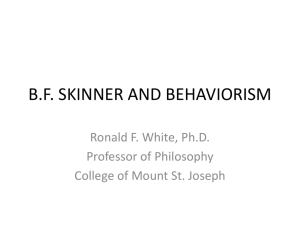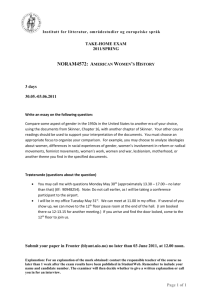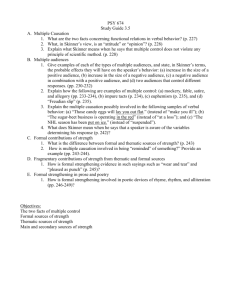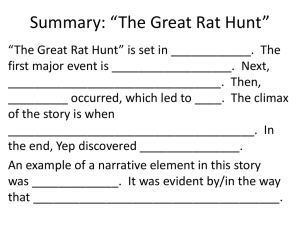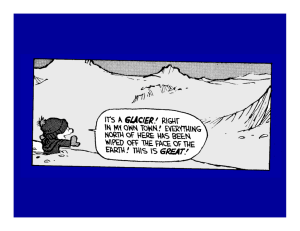Pick five chapters and answer the questions for that
advertisement
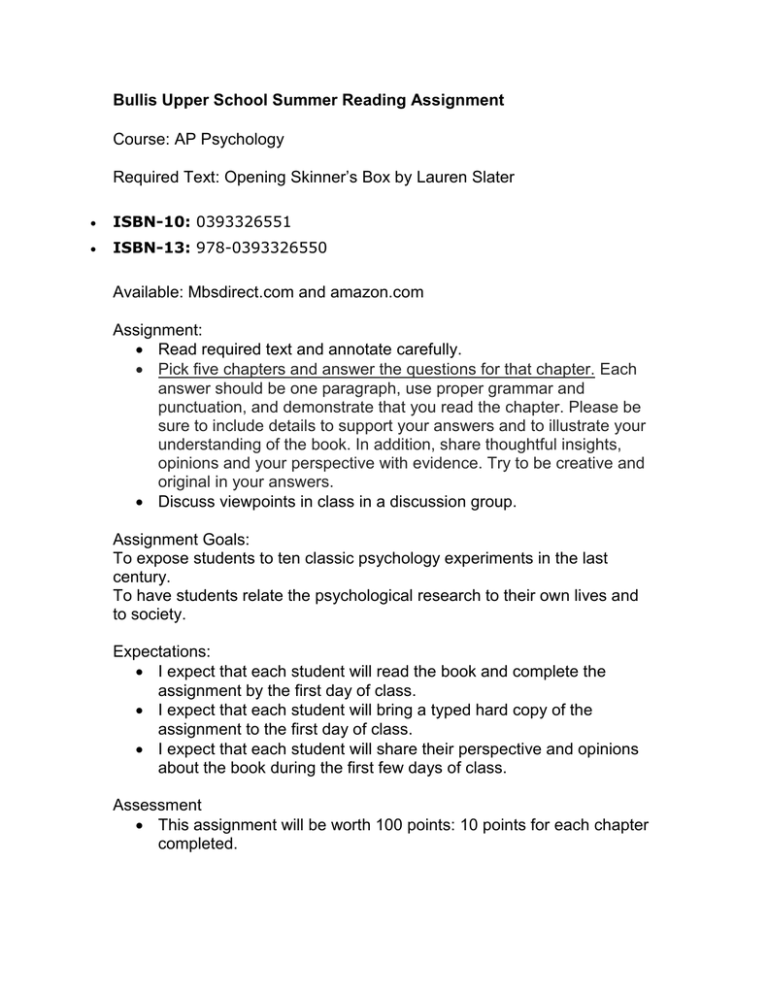
Bullis Upper School Summer Reading Assignment Course: AP Psychology Required Text: Opening Skinner’s Box by Lauren Slater ISBN-10: 0393326551 ISBN-13: 978-0393326550 Available: Mbsdirect.com and amazon.com Assignment: Read required text and annotate carefully. Pick five chapters and answer the questions for that chapter. Each answer should be one paragraph, use proper grammar and punctuation, and demonstrate that you read the chapter. Please be sure to include details to support your answers and to illustrate your understanding of the book. In addition, share thoughtful insights, opinions and your perspective with evidence. Try to be creative and original in your answers. Discuss viewpoints in class in a discussion group. Assignment Goals: To expose students to ten classic psychology experiments in the last century. To have students relate the psychological research to their own lives and to society. Expectations: I expect that each student will read the book and complete the assignment by the first day of class. I expect that each student will bring a typed hard copy of the assignment to the first day of class. I expect that each student will share their perspective and opinions about the book during the first few days of class. Assessment This assignment will be worth 100 points: 10 points for each chapter completed. Rubric: For each chapter: 10: Fully answered all questions. Used powerful supporting details from the text to illustrate their understanding of the book. Supported his or her perspective with thoughtful insights and evidence. Included creative and original ideas. 5: Answered questions. Used some details for support. Provided some support for his or her perspective. Ideas were average. 1: Did not fully answer the questions. Did not use details for support. Did not offer his or her perspective. Ideas were not original or creative. Chapter 1: B.F. Skinner’s Rat Race What did Skinner find were the most effective ways of shaping behavior? Is it evil for the government to use the shaping techniques like Skinner’s to make its citizens more virtuous? Chapter 2: Stanley Milgram and Obedience to Authority Why were almost two-thirds of Milgram’s subjects willing to deliver what they believed to be a lethal shock to a complete stranger? What types of people were most willing to deliver the lethal shock? What would you have done? Chapter 3: On Being Sane in Insane Places What, if anything, did Rosenhan’s experiment prove? What, if anything, did Slater learn about psychiatry today in her reenactment of Rosenhan’s experiment? Chapter 4: Darley and Latane’s Training Manual—A Five Stage Approach What factors determine whether or not someone will help in an emergency situation? Have you ever experienced the “bystander effect” or have you ever intervened in an emergency? Describe either situation and compare it to one of the experiments or demonstrations in the chapter. Chapter 5: The Experiments of Leon Festinger Give an example of cognitive dissonance (real or just realistic) and describe what you or others you’ve witnessed have done to reduce it? Chapter 6: Monkey Love According to Harlow’s experiments, what do infant monkeys need in order to develop normally? Was the knowledge gained from this experiment worth the suffering the animals were put through? In general what should be the guidelines about experimenting on animals? Chapter 7: Rat Park What did the Rat Park experiment demonstrate? Do you agree with Alexander’s conclusions about addiction? Why do you think his ideas are not more widely accepted? Chapter 8: Lost in the Mall What does the Lost in the Mall experiment tell us about memory? Why are the results so controversial? Is Loftus’ personal life relevant to her scientific career? Chapter 9: Memory Inc. What is the role of CREB in our memories? Is the development of a perfect memory drug something that the government should encourage or discourage? If the pill existed, would you take it? Chapter 10: Chipped: This Century’s Most Radical Mind Cures Should psychosurgery be performed if the results are uncertain? Knowing what we know now, should Moniz have been allowed to perform the lobotomies that he performed? When is experimental surgery ethical?
